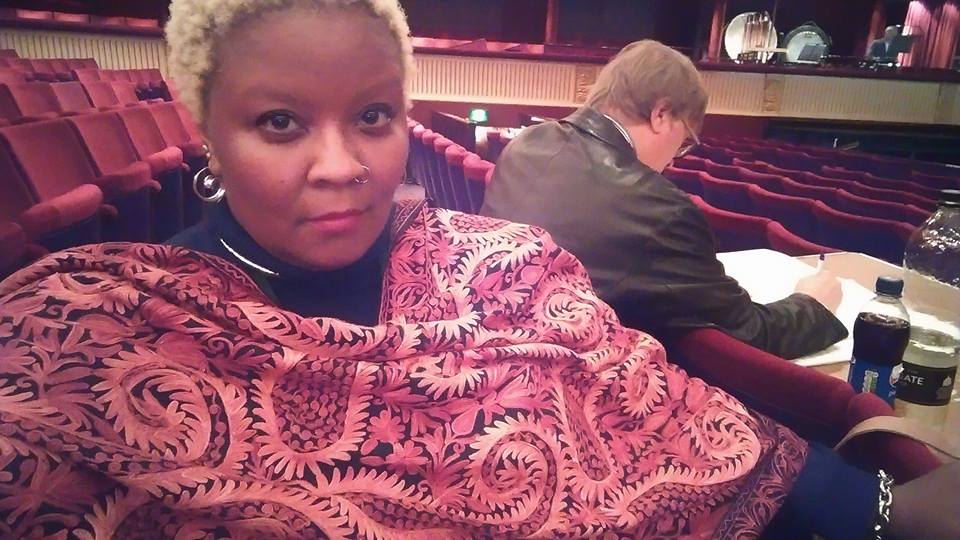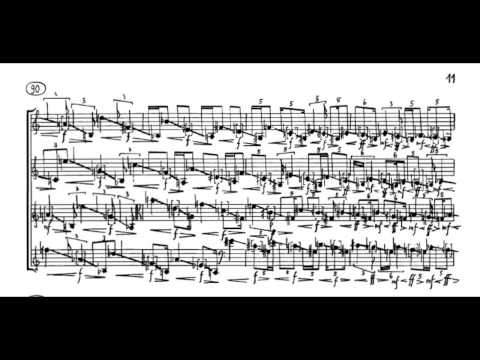I studied composition with Georg Friedrich Haas in Basel from 2011-2013, his last years there before his move to New York City, where he teaches at Columbia University. In my Master’s recital, a musician showed late and an instrument I built broke, and I had trouble facing the—very supportive—audience. He managed to make me do so. Our last lesson, afterwards, was dedicated to the subject of personal confidence.
Maybe this talk reflected a change in Haas at the time, too. As his new wife and partner Mollena Lee Williams-Haas put it in a speech to Playground Sexuality Events, “he is freshly out as a kinky person.” We spoke by phone and email about this change and its effect on his life and music.
VAN: When I emailed you about doing this interview, you responded that you were a different person from the teacher I knew in Basel. What did you mean by that?
Georg Friedrich Haas: For decades, I tried to suppress and reject my sexual orientation. I thought of it as immoral. Then I decided to embrace it. I was incredibly lucky to find a partner who is willing to embrace it with me. This weight—I’ve carried it for decades, now suddenly it’s gone. That has caused a very fundamental change in me.
How did you meet Mollena?
The way things started wasn’t especially romantic. We met online, on OK Cupid—it wasn’t even a special website.
You both have decided to be very public about your sexuality.
Yes, she is very open about it, and since I’m her partner, I’m automatically present in public too. This is very much a part of the change in me. I don’t need to be ashamed of my orientation; I don’t mind if it’s discussed in public. But I’d like to go one step further. For four decades, I suppressed something. I had three marriages, all of which were doomed to fail, even though at least some of my ex-wives were fantastic people. My three children have a father whose interests are irreconcilable with normal family life. My life, and the lives of the people close to me, would have been better if I hadn’t suppressed my orientation. Now I’m living my sexuality openly—and an important part of that is, I want to encourage people a few decades younger than me to embrace and accept the way they feel. I don’t want them to try and suppress their feelings for decades like I did.
The latest from VAN, delivered straight to your inbox
How has this change affected your work?
I’m able to write more than I ever could before. And when I’m writing, I feel more concentrated, at ease, lighter than I used to. I no longer need composition as a form of psychotherapy. Instead it’s become a spiritual act; in exploring the world of sound, I venture into places…other people look for that feeling in religion. I can focus my entire life on music. My partner is submissive, which means that she makes her own wishes subordinate to mine. And a side effect of this is that I have someone by my side who takes care of all the problems of daily life for me. I’m able to dedicate 100 percent of my time—well, maybe 80 percent—to composing. I spend the the rest of my time on my personal life and on teaching.
How important was moving to New York in bringing about these changes?
There are many factors. First of all, I felt truly honored to be able to teach at one of the best universities in the world. The quality of life in New York, its endless freedom, made it possible for me to work with a clear head, with more concentration than ever before.
Do you think that there’s a connection between the solitary work of composition and the intense sexuality of some composers?
Well, being alone and being sexual are not mutually exclusive. To be honest: I’m not sure that the sex is more frequent—maybe it is—but that’s not really what matters. What matters is that I’ve stopped wasting time looking for the ideal partner. The difference between a relationship that’s working and one that isn’t is, in a healthy relationship you don’t waste any time looking for an alternative.
And it’s not as simple as saying: the more you ejaculate, the more you can compose [laughs]. On the contrary. You know, I never liked the music of Hans Werner Henze. It’s cold, elusive, it just never spoke to me. At one point, I read in his autobiography that he only composed when he felt relieved of sexual tension. And what I thought, a little wickedly, was, Yes, you can tell [laughs].
What other composers were especially influenced by their sexuality, in your view?
Schubert, definitely.
But I think we first need to ask ourselves what sexuality really is. It encompasses more than just what happens with your genitals. I don’t want to talk about the sexuality of female composers here—I couldn’t do that—but I think that, for many male composers, music had a way of becoming a substitute for a real-life partner.
I was in Darmstadt, I think it was 1996, and an American musicologist did a lecture on music and sexuality. She showed how the formal principles of classical music were analogous to the male orgasm, and analyzed them in terms of foreplay, building up of tension, relaxation after climax, and postcoital coda. Not coincidentally, the Second Viennese School demanded an explicit climax in music—see Otto Weininger.
In reality, though, compositions in new music can’t be ordered according to gender. In the discussion that followed, we agreed that the most feminine music we heard at Darmstadt was by Morton Feldman, and the most masculine was by Olga Neuwirth.

Have you ever tried to compose music that is directly related to sexual acts?
Yes, in 1989. My lover was quite loud, and I had a tape recorder going. I wanted to reproduce the timing of the sounds she made in music, and trigger the sonic development of the work that way. Then we had an argument, and she deleted the contents of the tape. I wrote the piece in memory of the rhythm of her moaning. It didn’t turn out well at all. These days it’s not even on my list on works. And I understood that literally depicting sex in music doesn’t work.
What about the sex scenes in your operas?
It works well in “Die Schöne Wunde,” but in that piece I’m singing about the emotions, not the act itself. In “KOMA,” [a new opera to be premiered at the Schwetzinger Festspielen this May] I wrote a scene that takes place in absolute darkness. The lover and the husband sing a passionate duet, but the object of their passion has nothing to say, she’s in a coma. I can write that kind of sex scene. I had a harder time with “Bluthaus”; there’s a scene that really happens, involving Nadja and the broker, and then her dead father joins in, and I wanted to give this event an immediacy through music, but I wasn’t happy with the result. I had to write a new version where I emphasized the spiritual context more than the physical function of the act.
You’ve also written pieces that were reactions to political events, such as “In Vain,” or “I Can’t Breathe.” Did they give you similar problems as the piece that was inspired by your sexuality?
Yes, in fact I had already decided not to write any more political music. Experience taught me that the language of music isn’t well-suited to the subject. In a political argument, you are arguing against someone, but in music, that’s impossible to do directly. The instant I set something in music, I’m identifying myself with it—even if, morally, I deeply reject it.
What inspired you to compose “I Can’t Breathe”?
Before I got to New York, I hadn’t realized the extent of the problem of racism against people of color. I knew the history of American racism, but when you live in New York you get a whole different impression. Several ancestors of my wife were kidnapped. When I’m out alone in an empty street, I’m afraid of crime, that someone will rob me or something like that. But when my wife is out alone, her main fear is the police. And that’s a very unsettling thought.
I live in a beautiful apartment with a view of the Hudson. One evening, I was looking out the window, and I saw 200 police cars flashing their lights. There was a huge Black Lives Matter demonstration going on in front of my house. In that moment, I wanted to go out and join the demonstrators. But then I realized that that wouldn’t have been my language or my personality.
At the time, I was working on “Morgen und Abend,” and I was under a lot of pressure. Still, I put it aside and wrote “I Can’t Breathe.” It was very important to me not to give the perpetrators a note; not even a rest; nothing.
Besides this political, or maybe more accurately, personal aspect of the piece—I’ve been working on the musical principle in it for two years now. The idea is to attempt a kind of melody based on extremely small intervals. “I Can’t Breathe” starts out in the traditional twelve-tone system, with the trumpet singing a kind of dirge, which then becomes increasingly constricted. Minor seconds become third, quarter, eighth, twelve and finally sixteenth-tones.
But if you’ll allow me to change the subject for a second, I’d like to articulate something that I think shows the connection between sexuality and music. At the beginning of my artistic development, I organized my music based on abstract principles. I composed complex mathematical processes, “serial” would be somewhat of an understatement. And at performances, I was surprised to realize that these pieces, despite their abstract construction, had a strong emotional effect.
I thought that the energy of the construction, the power inherent in the mathematically organized materials, would have a direct result in the music. But I noticed that incorrect calculations or other mistakes didn’t diminish the works at all. I composed “Nacht-Schatten,” which was my most successful work in the 1990s, on a desktop computer. Then a student of mine did an analysis of it and found over 250 serious mistakes. It’s pretty obvious why—when you work from a flickering computer screen writing numbers down on paper, it stands to reason that about two percent of them will be wrong. But the piece worked, completely. And that is very hard to explain, because the changes were unintentional.
Why do you think that is?
I found an answer in the Robert Mapplethorpe saying, “S&M means sex and magic.” It’s the magic of voluntary submission. As the composer, I was the “master,” and the interpreters were my “slaves.” They had submitted themselves voluntarily to my score. They had to do things that were completely meaningless, but they did them with absolute precision. It’s like a sadomasochistic ritual, where the submissive partner has to do something without knowing the reason why. The emotional effect comes from the naked act of submission, which contains an almost spiritual energy.
I decided not to continue composing this way, however. I don’t want the effect of my music to depend on the tension coming from people who are doing their absolute best, and more, to play what’s written on the page. It should come solely from the power of the sounds I compose.
When I studied with you in Basel, I remember that you often went—or fled—to your cabin in the Black Forest to compose. Do you still go somewhere “off the grid” to write?
At home! For God’s sake. Back then I needed to flee to some cabin in the woods, and now I can compose at home, with Mollena. ¶
Subscribers keep VAN running!
VAN is proud to be an independent classical music magazine thanks to our subscribers. For just over 10 cents a day, you can enjoy unlimited access to over 875 articles in our archives—and get new ones delivered straight to your inbox each week.
Not ready to commit to a full year?
You can test-drive VAN for one month for the price of a coffee.




Comments are closed.